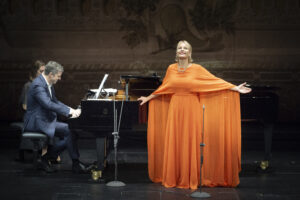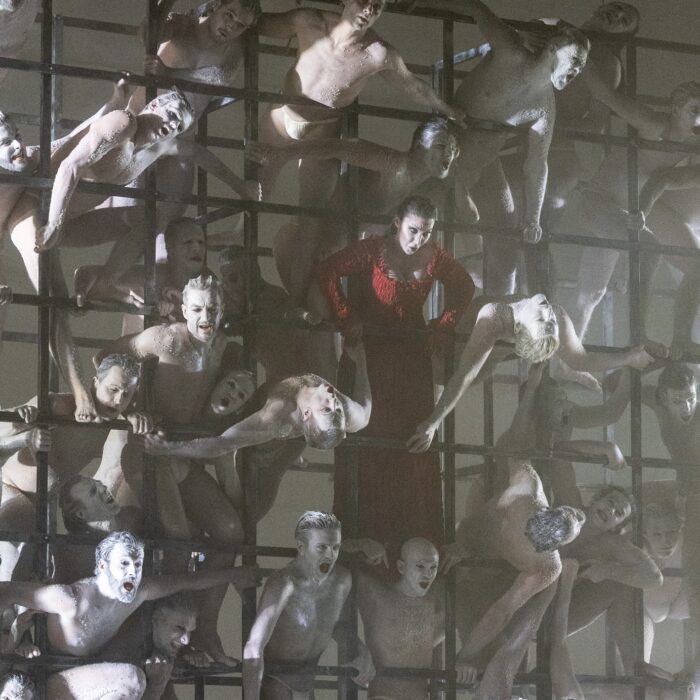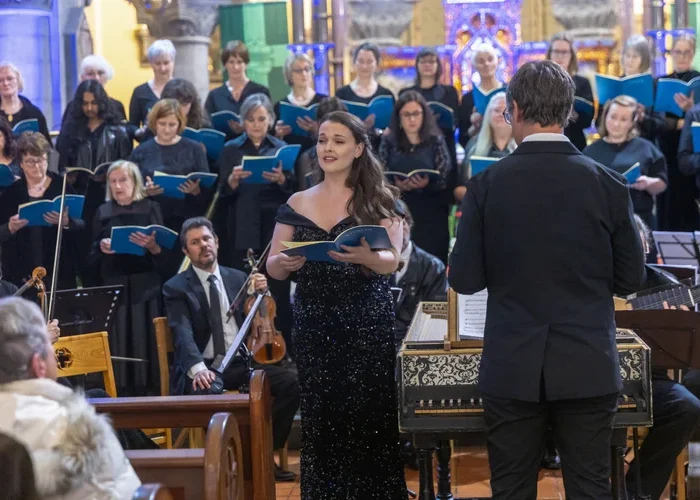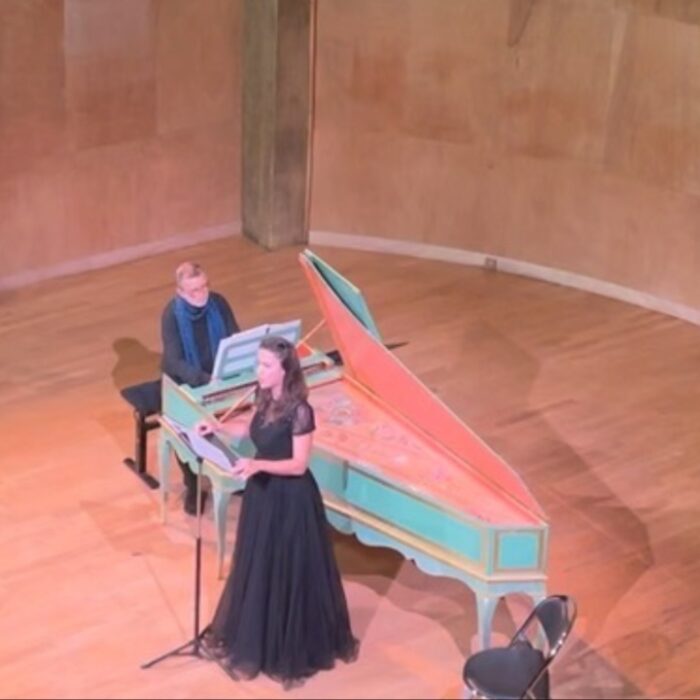
Opernhaus Zürich Recital 2025-26 Review: Elīna Garanča
Latvian Mezzo-Soprano Captivates in Opening of Liederabend Series
By Francisco Salazar(Photo: Gaetan Bally)
On Sept. 19, the Zürich Opera opened its 2025-26 Liederabend series featuring Latvian mezzo Elīna Garanča and new General Director Matthias Schulz at the piano. The evening promised to be an enchanting one filled with rich musical journeys in lieder, song, and arias. The result was exactly that. A program of captivating qualities that showed why Garanča is one of the best in the world.
Part One
The program opened with five songs by Brahms, each showcasing the many colors of Garanča’s voice. The “Liebestreu” op.3, No. 1 brought out the mezzo-soprano’s dark chest voice as she opened the evening and slowly revealed the darker hues of her lyric mezzo. The following pieces, “O Wüsst ich doch den Weg zurück” and “Die Mainacht,” showed a more tender timbre as she relished in the gorgeous legato lines of Brahms’ melody. Garanča sang with a sweeter and brighter sound that contrasted greatly with the opening number. Her dynamics also remained in a mezzopiano and resonated with depth throughout the hall. The “Alte Liebe” was drama in every way as the mezzo opened with a piano sound in her lower notes. Still, as the melody increasingly became more dramatic, the mezzo’s voice grew, reaching a fortissimo. This truly conveyed the piece’s emotional elements. The Brahms section ended with “Geheimnis.” Garanča’s caressing and warm tone never moved away from a mezzopiano.
For her second selection of the evening, Garanča chose Schumann’s “Frauenliebe und Leben,” op. 42. The Schumann piece showed the mezzo in a very calm and gentle timbre. Each piece saw the mezzo sing with precise diction, especially during the “Ich kann’s nicht fassen, nicht glauben,” which also saw her emphasize the rhythmic qualities of the piece. The gentleness of her voice was on full display during the “Seit ich ihn gesehen” and the “Du Ring an meinem Finger” while the “helft mir, Ihr Schwestern” had a forward movement and directness. The voice took on some more sound, especially in the accented phrases, and then quickly went to the quiet and lower parts of the voice, ending the piece in beautiful decresendo. “Süsser Freund, du blickest” had a meditative quality as the mezzo’s voice took on a darker hue and the tempo had an elegiac feel at the beginning. The second part of the song, “Wie sobang mein Busen,” saw Garanča sing with a more forward drive while also emphasizing the gorgeous connected lines and holding out certain passages with a silvery tone. “An meinem Herzen, an meiner Brust” saw the mezzo lighten her sound with some airy tones while also emphasizing the playful nature of the rhythm. “Nun Hast du mir den ersten Schmerz getan” ended in a pensive and introspective way with the mezzo holding back and emphasizing the piano dynamic. She ended the piece with her sound slowly dying out.
Part Two
The first half was a more finessed and contained sound from the mezzo in the lieder way, while the second half was all about emotion.
Berlioz’s “D’Amour l’ardente flamme” opened the second half, and here the mezzo gave into the emotional pull of the music, singing with a fortissimo sound at one point and at another a hushed and floating piano that emphasized the delicacy of her character’s emotions. Then there was clear attention to the syncopations at another moment in the piece.
The second selection of this part consisted of three Duparc songs, which were a revelation. Garanča opened with “Au pays où se fait la guerre,” which started with a melancholic timbre that emphasized the richness of her middle voice. As the song developed, the mezzo’s voice also grew in sound, and she reached the higher parts of her range with resounding volume that resonated with might into the hall, showcasing Garanča’s dramatic skills. The second song, “L’Invitation au voyage,” saw the mezzo once again scale back the sound and float some gorgeous notes, which were supplemented beautifully by the rhythmic runs on the piano that emphasized the waves of the music. The result was that the two created a gorgeous impressionistic color palette that emphasized the delicacy of the music. The last of the three songs was “Phidylé,” which brought out Garanča’s most intimate sound with spellbinding effect. She scaled back the sound, bringing out the opulence of her middle voice and emphasizing the elegance of her legato line. But as the song reached its climax, Garanča’s voice blossomed into a rich forte.
Garanča continued with three Latvian songs, Jāzeps Mediņš’ “Sapņojums,” Jāzeps Vītols’ “Sapņu Tālumā’s” and “Man prātā stāv vēl klusā nakts.” All three songs were sung with an expressiveness and rich sensitivity that almost felt like one could understand every word she sang. The audience could feel the affinity she had for her native tongue.
“Voi lo sapete, o mamma” from “Cavalleria Rusticana” was a tour de force as the mezzo dug deep into each phrase and expressed the feeling of pain and betrayal. Her “M’amo, ‘amai” was raw and effective as she rose to the top of her voice, and at the start of the B section, Garanča’s voice took an anguish and yearning sound as she sang, “priva dell’onor.” The aria climaxed at a resonant high note in “io piango” before repeating the text and going into the lower depths of her voice.
She ended the formal part of her recital with a sultry rendition of “L’amour est un oiseau rebelle” from “Carmen.” Here, the mezzo flirted with the audience, singing with a suave tone while looking and pointing as she sang the lines, “Et si je t’aime, prends garde a toi.” The voice was captivating and lush, and as she ended the aria, she held out the final note on “prends garde a toi” for a long time, showing her immense and virtuosic breath support.
Garanča received a healthy standing ovation, and she ended up doing three encores. The final two encores were, in my opinion, the most interesting musically. The second being “Mon cœur s’ouvre à ta voix” from “Samson et Dalila,” where Garanča poured her heart into every phrase with connected rich legato lines. The third encore was the “Nana (berceuse)” by Manuel de Falla. Here, the mezzo was precise with Spanish text, and her elegant flamenco runs were accurate. But more than anything, she gave each phrase a Spanish flair as she sang the Iberian sounds of De Falla’s music.
On piano, Matthias Schulz was a perfect fit for the mezzo as he followed her with subtlety and never got in the way of her voice. His best moments were those of the Duparc, especially the second song, where he emphasized the ethereal colors of the music, and the Schumann, where he was able to showcase some of the mournful and somber colors on the instrument. His two solo pieces, Mendelssohn’s “Lied ohne Worte” and Schumann’s “Arabeske,” were performed with elegance and rhythmic precision.


